
Mental health is often called the “invisible illness.” This is because so many people suffer from mental health problems, but do not talk about them openly. This can be a problem because it means that people with mental health issues may feel like they are alone and that they have to deal with their problems on their own. In this article, we will discuss the signs of poor mental health in the workplace. If you see any of these signs in your coworkers or employees, it is important to take action and get help for them.
Recognizing and Addressing Mental Health in the Workplace
Mental health is often considered a negative topic, and as a result, many people are uneasy discussing it. This can be especially true in the workplace where it’s essential to seem tough and capable. Nevertheless, weak mental health can profoundly affect work performance and productivity. It’s crucial to be familiar with the warning signs so that problems can be dealt with quickly.
The Early Stage of Mental Illness
People feel comfortable sharing their problems because of the embarrassment of mental health concerns and the difficulty in diagnosing them. When mental health issues go unrecognized and untreated, the organization and the employee face deeper issues.
To fight this, you can build a supportive workplace for mental health, but you should still be alert for any early warning signals. Early detection of mental illness in both men and women will allow you to have a much more positive influence with your support.
There are three levels of symptom severity: mild, moderate, and severe. Note that a person may experience different symptoms at varying levels of severity simultaneously.
Mild: Mild symptoms that don’t interfere with your daily life
Moderate: Symptoms that may make their daily life far more difficult than usual.
Severe: Several symptoms may make it difficult to go about one’s daily routine.
You can help your employee maintain a delicate balance between their work and personal life by catching these signs early on and supporting them.
Physical Indicators of Mental Illness
Mental illness can manifest itself in many different ways, and not all of them are obvious. Physical symptoms are often one of the first things that people notice when someone is struggling with their mental health, but they can be easy to overlook or dismiss.
Here are some physical indicators that someone might be struggling with their mental health:
Unexplained aches and pains
Fatigue or low energy
Difficulty sleeping or sleeping too much
Changes in appetite or weight
Digestive problems
Headaches or migraines
Psychological Indicators
It’s not always easy to tell when someone is dealing with poor mental health. In the workplace, we often put on a brave face and power through despite how we’re really feeling. But there are some telltale signs that can indicate when someone is struggling. If you’re concerned about a colleague, here are some psychological indicators of mental illness to look out for:
withdrawing from social interactions or isolating oneself
appearing more tired or sluggish than usual
exhibiting sudden changes in mood or behavior
having difficulty concentrating or completing tasks
exhibiting signs of anxiety or depression
Behavioral Indicators
Most of the time, we can mistake behavioral cues for bad manners or work ethics, which can lead to an employee receiving unfair sanctions. If any of these signals appear in your employees, it’s worth speaking to them rather than punishing them. Signs that someone is having a mental health issue might include:
Withdrawing from social activities or isolating oneself from others
Loss of interest in work or hobbies
Changes in eating habits
Difficulty concentrating
Excessive worry or anxiety
Irritability or short temper
Sadness or hopelessness
Next Steps
Employees may be hesitant to discuss their mental health issues with their boss because they are unaware that they have an issue or are frightened of doing so. Mental health is a sensitive and personal topic to discuss among coworkers, managers, and employers. No matter what life throws our way, it is always important to be compassionate and understanding when dealing with mental health.
How Can You Help?
Before you approach the employee, you’ll need to prepare a strategy. Whether you talk to your human resources department, corporate department, or anyone else, it’s essential to get input from professionals before making any hasty decisions. A good boss always has a plan for the company and its staff.
The way to handle mental health difficulties is distinct from other performance-related concerns, therefore the approach must be different. You must show empathy for their worries, difficulties, and personal issues. It’s vital to keep in mind that while most individuals suffering from a mental illness have no control over how they feel, their condition would not influence their work life if they were given a choice.
It’s important to remember that persons with mental illnesses are no different than others with physical limitations. It’s vital to not discriminate against anybody who has a mental illness and to ensure your conversation is private. Inquire about anything affecting their work by asking if there is anything wrong that makes it difficult for them to do their job. It’s imperative to make space for your employees where they feel comfortable speaking freely and openly expressing themselves.
About the Authors
Transitions Center for Natural Mental Health Treatments for a variety of physical and mental dependency issues and conditions. Substance use disorders are difficult to understand for many people. The physical and mental aspects of any substance disorder are complicated and unique to the individual suffering. The differences between physical and psychological dependency vary but have some similarities. Transitions Center for Natural Mental Health Treatments help the public know what to look for as a means of helping a loved one cope with the challenges of mental health disorders.
Thank you to Mary Jane’s CBD Dispensary, the highest-rated CBD online marketplace. Mary Jane’s CBD Dispensary is a family-owned business that has been operating in the United States for over 5 years. They offer top of the line and quality made products to customers at an affordable price. Their team is extremely passionate about cannabis, hemp, and all its benefits. If you are looking for high-quality natural remedies for your health or mental disabilities check out what they have! Get in touch with them if you want more information on any of their products or services offered at Mary Jane’s CBD Dispensary.
